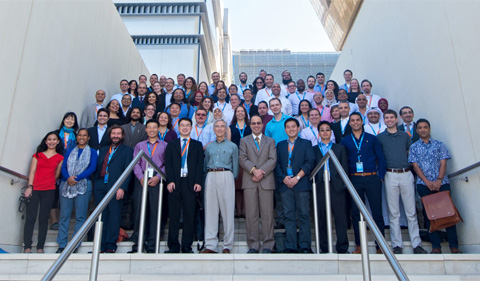
Participants of the Fourth Arab-American Frontiers of Science, Engineering and Medicine Symposium in Abu Dhabi.
By Raymond Humienny
NQPI editorial intern
Science not only breaks boundaries, it also builds communities across international barriers.
On Nov. 5, 2016, Ohio University’s Wojciech Jadwisienczak, Professor of Electrical Engineering and Computer Science and Nanoscale & Quantum Phenomena Institute member, helped expand scientific horizons at the fourth Arab-American Frontiers program in Abu Dhabi, United Arab Emirates.
Inspired by former President Barack Obama’s “A New Beginning” speech in Cairo, the National Academy of Sciences launched the first Arab-American Frontiers of Science, Engineering and Medicine program in 2011, an interdisciplinary and international effort to bring together U.S. and Arab researchers with similar interests. Frontiers serves as not only a collaboration of ideas but also application of research for Arab regions that includes scientists from the United States and the Arab League.
“The Frontiers symposium is an unprecedented opportunity for U.S. and Arab scientists to share state of the art knowledge on a wide array of topics and explore how these findings apply to the regional context,” said Dalal Najib, senior program officer at the NAS.
Jadwisienczak showcased ongoing research in Frontier’s session on Solar Energy and Water for Sustainable Living. His collaboration with Arab partners in Tunisia, Saudi Arabia and Pakistan explores developing novel materials for solar energy conversion, as well as mercury-free deep ultraviolet devices for germicidal applications (in general) and chemical additive-free water treatment (in particular).
“I found that U.S. researchers, who working specifically on solar energy and water problems, can (find) opportunities to bolster their efforts when interacting with people from Arab countries who consider these technological challenges as critical for their nations,” Jadwisienczak said. “Thus, there is a lot of potential in Frontiers. People who work with that shall definitely consider (Frontiers) as a step forward toward fostering their collaboration.”
Back in Athens, OH, NQPI has served as a catalyst for former Arab students to develop research relationships between their home countries in the Arab region and the U.S. For example, Jadwisienczak collaborates with former OHIO and NQPI students Mohammad Ebdah, Hamad Albrithen and Aurangzeb Khan. Ebdah and Albrithen work as professors at King Saud University in Riyadh, Saudi Arabia; and Khan works as a professor at Abdul Wali Khan University, in Mardan, Pakistan. Albrithen said these collaborations facilitate a healthy international rapport between scientists.
“I would suggest the highest level of engagement with (international collaboration) since going international requires breaking barriers and building bridges,” Albrithen said.



















Comments